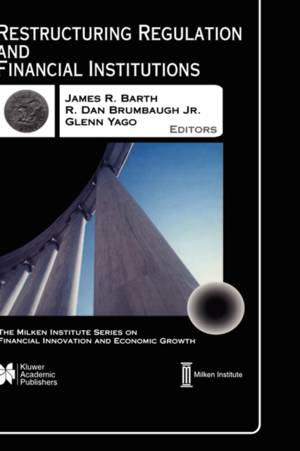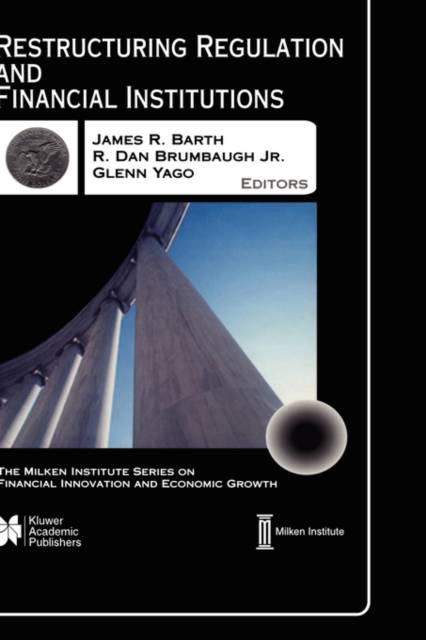
- Afhalen na 1 uur in een winkel met voorraad
- Gratis thuislevering in België vanaf € 30
- Ruim aanbod met 7 miljoen producten
- Afhalen na 1 uur in een winkel met voorraad
- Gratis thuislevering in België vanaf € 30
- Ruim aanbod met 7 miljoen producten
Zoeken
Restructuring Regulation and Financial Institutions
€ 335,95
+ 671 punten
Omschrijving
Policy makers around the globe will find that Restructuring Regulation and Financial Institutions offers a cogent assessment of the contemporary regulatory environment in the U.S. financial markets, and a blueprint for action in evolving global financial markets.
Financial markets are among the most highly-regulated markets in the world. Nevertheless, financial crises still occur, witness the U.S. savings-and-loan fiasco of the late 1980s and early 1990s, and the Mexican and East Asian Financial implosions of 1994 and 1997. What role does regulation play in stabilizing-or-destabilizing financial markets? Restructuring Regulation and Financial Institutions answers this question with incisive analysis of financial market regulation in the United States.
Each paper considers how regulation enhances or impedes the efficiency of a particular financial sector, and is followed by comments by two or three noted experts. The result of this approach is a wealth of useful information that may be applied by policy makers contemplating the restructuring of regulations and financial institutions.
The contributors to this volume are distinguished economists, many of whom have careers not just in business, government, or academia, but have held influential positions in all three. Such varied backgrounds enable the contributors to offer remarkable insights based on the best of theory and practice.
Never before has understanding the workings of U.S. financial market regulation been so important to the development of world financial markets. The ramifications of financial regulation in the United States extend far beyond the nation's borders. World financial markets are undergoing dramatic change, driven by the rapid development and deployment of new technology that enables information-and money-to travel farther, faster. However, a Byzantine array of regulatory structures in the international arena hinders the development of efficient global financial markets. Policy makers around the world are attempting to address the issues by emulating the financial markets of the United States.
Financial markets are among the most highly-regulated markets in the world. Nevertheless, financial crises still occur, witness the U.S. savings-and-loan fiasco of the late 1980s and early 1990s, and the Mexican and East Asian Financial implosions of 1994 and 1997. What role does regulation play in stabilizing-or-destabilizing financial markets? Restructuring Regulation and Financial Institutions answers this question with incisive analysis of financial market regulation in the United States.
Each paper considers how regulation enhances or impedes the efficiency of a particular financial sector, and is followed by comments by two or three noted experts. The result of this approach is a wealth of useful information that may be applied by policy makers contemplating the restructuring of regulations and financial institutions.
The contributors to this volume are distinguished economists, many of whom have careers not just in business, government, or academia, but have held influential positions in all three. Such varied backgrounds enable the contributors to offer remarkable insights based on the best of theory and practice.
Never before has understanding the workings of U.S. financial market regulation been so important to the development of world financial markets. The ramifications of financial regulation in the United States extend far beyond the nation's borders. World financial markets are undergoing dramatic change, driven by the rapid development and deployment of new technology that enables information-and money-to travel farther, faster. However, a Byzantine array of regulatory structures in the international arena hinders the development of efficient global financial markets. Policy makers around the world are attempting to address the issues by emulating the financial markets of the United States.
Specificaties
Betrokkenen
- Uitgeverij:
Inhoud
- Aantal bladzijden:
- 484
- Taal:
- Engels
- Reeks:
- Reeksnummer:
- nr. 1
Eigenschappen
- Productcode (EAN):
- 9780792373643
- Verschijningsdatum:
- 31/08/2001
- Uitvoering:
- Hardcover
- Formaat:
- Genaaid
- Afmetingen:
- 156 mm x 234 mm
- Gewicht:
- 866 g

Alleen bij Standaard Boekhandel
+ 671 punten op je klantenkaart van Standaard Boekhandel
Beoordelingen
We publiceren alleen reviews die voldoen aan de voorwaarden voor reviews. Bekijk onze voorwaarden voor reviews.










